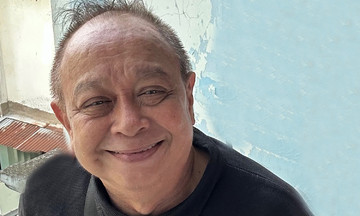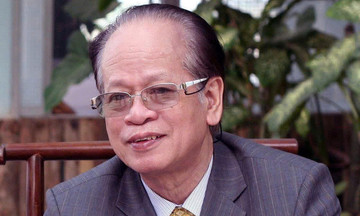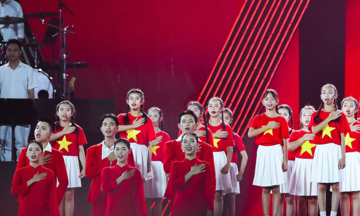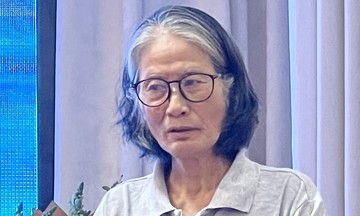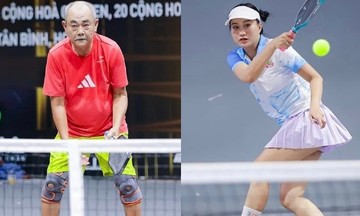Directed by Dang Thai Huyen, "Mua do" has become a focal point in Vietnamese cinema. This film, inspired by the historical war theme, has broken multiple records, earning over 650 billion VND.
Trinh Hoa Binh, a veteran who was present for over 10 days during the final phase of the 81-day campaign, argues that no battles took place inside the citadel as depicted in the film. Nguyen Viet Noi, a special forces soldier from K10 unit stationed at Quang Tri Citadel, points out several fictionalized details, such as soldiers eating rice, live snakes, and keeping songbirds. According to him, soldiers only had dry rations at that time, and no animals could have survived the intense bombardment.
Veterans also argue that the scene depicting South Vietnamese soldiers torturing a North Vietnamese soldier is inaccurate. The scene where the two main characters engage in hand-to-hand combat near the end of the film has also been deemed unrealistic. Poet Le Ba Duong, author of the poem "Loi nguoi ben song", said, "The fighting style in the film is not how we fought back then, at least not in Quang Tri."
These opinions have fueled criticism of the film. The depiction of burning and torturing prisoners of war has also sparked debate. Writer and veteran Nguyen The Tuong, from Brigade 202, Division 1, believes the burning scene was unnecessary, as it "reopens healed wounds" and diminishes the film's message of national reconciliation.
In his memoir "Mot thoi Quang Tri," Senior Lieutenant General Nguyen Huy Hieu, former Deputy Minister of National Defense, writes about the hero Cao Nhu Thiem, who led a three-man team against hundreds of American soldiers. When they ran out of ammunition, they resorted to hand-to-hand combat.
Veteran Nguyen Viet Noi said, "The actual combat was hundreds of times more intense. The filmmakers included many details, such as the image of the bird, to lighten the film. If they depicted it exactly as it was, I don't think the audience could bear it."
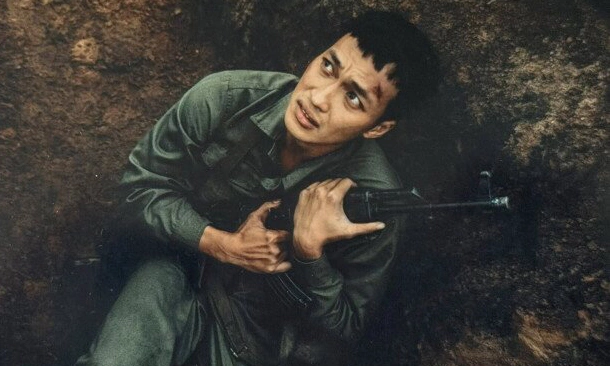 |
Lam Thanh Nha (as Binh) in "Mua do". |
Director Dang Thai Huyen stated that she read, listened to, and considered all feedback but could only select details that fit the narrative: "I couldn't include all of history in the film, nor could I meet every witness. I could only choose what I wanted to convey. I hope the film inspires the audience to learn more about these historical stories, to love their ancestors and their country, and to cherish peace."
The director previously explained, "During filming, we consulted numerous documents about the battle at the citadel recorded by war correspondents and listened to witnesses. However, we established that this is a feature film with fictional elements. The important thing is that the film inspires viewers to feel the fragments of the war and history, motivating them to delve deeper into the 81-day battle of Quang Tri and related events."
Screenwriter Chu Lai said, "I don't have an answer to this issue. A thorough seminar is needed to find the truth." At the film's premiere, he stated, "Films, novels, or epic poems cannot fully capture the spirit of Quang Tri. The film is just a slice of history that our nation has experienced."
Many experts believe there's always a gap between history and art. The audience's reaction to "Mua do" is understandable, as viewers enter the theater with preconceived notions about the time and story.
Dr. Ha Thanh Van, a literary scholar, analyzed, "Every film has 'gaps' for the audience to fill with their imagination, memories, and experiences. In 'Mua do,' that gap is how war is depicted: tragic or brutal, starkly realistic or artistically fictionalized. Each viewer brings their own experiences and needs, leading to different, even opposing, interpretations. Some see it as a historical document, others as a work of art, and others simply as a media phenomenon."
However, Dr. Ha Thanh Van believes the praise and criticism affirm the film's impact. She argues that war films not only revisit the past but also engage in a dialogue with the present. "Mua do" has initiated this dialogue, with the public reacting with pride, skepticism, criticism, and a range of other emotions. "The film's success lies not only in its revenue, artistry, or propaganda value but in its ability to spark debate. The audience's participation, debate, and co-creation have elevated the film beyond entertainment, making it a cultural phenomenon," she stated.
Regarding fictionalization, director Phi Tien Son stated, "Fiction is often based on truth. History is easily debated because everyone views it from different angles. Some accept fictionalization, others don't. Filmmakers can retain, change, add, or subtract, but they shouldn't fabricate."
Therefore, when approaching the film, it's crucial for viewers to understand the difference between documentaries and historical films. Artistic works require fictional elements. However, this fictionalization must be reasonable, enhancing the values and messages the filmmakers want to convey.
Historian Duong Trung Quoc noted, "Documentaries must adhere strictly to facts, while historical films are allegorical. Directors can use allegories to convey deeper messages rather than simply recreating events. Cinema cannot alter the past, but it can create something better for the present and future."
Produced by the People's Army Cinema, "Mua do" boasts high-quality content and visuals that evoke strong emotions. The script follows the 81-day battle to defend the citadel. Writer Chu Lai focuses on the human element, specifically a small squad of young soldiers from three regions of Vietnam.
The film involved extensive pre-production, with grand sets and large-scale battle scenes. The producers haven't disclosed the investment, but many estimate it reached hundreds of billions of VND. The crew built a 50-hectare film set on the banks of the Thach Han River. During filming, they used modern equipment and lighting. For many scenes, the cinematographer used up to seven cameras.
The central character is Cuong (played by Do Nhat Hoang), a charismatic and skilled martial artist from the Conservatory of Music. He gives up a chance to study abroad to enlist. During the battle in Quang Tri, Cuong fights alongside his squad: Ta (the squad leader), Binh, Tu, Hai, and Sen. They come from different backgrounds and have distinct personalities, but they share the same goal: to fight for peace.
Ha Thu - Que Chi
Photos, video: Provided by the film crew




